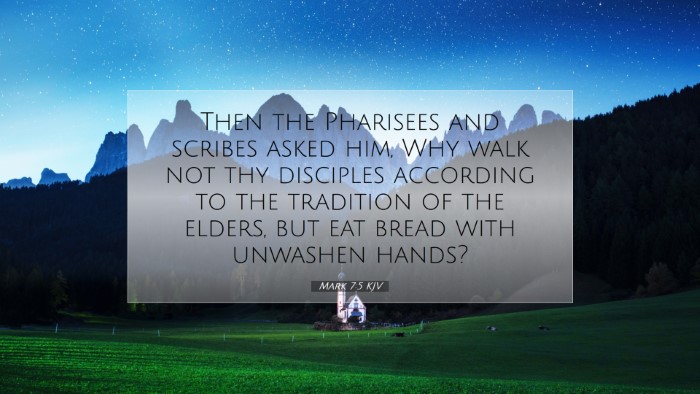Commentary on Mark 7:5
Verse: "Then the Pharisees and scribes asked Him, 'Why do Your disciples not walk according to the tradition of the elders, but eat bread with unwashed hands?'" (Mark 7:5, NKJV)
Introduction
This passage from the Gospel of Mark addresses the conflict between the Pharisees' oral traditions and the teachings of Jesus. It highlights the tension between religious legalism and the principles of faith and purity. In this commentary, we will explore the insights offered by eminent theologians, focusing on the implications of this query posed by the Pharisees towards Jesus and His disciples.
Contextual Background
The Pharisees and scribes represented the religious authorities of the day, adhering strictly to the oral traditions that had evolved over centuries. These traditions were aimed at maintaining ritual purity and compliance with the Law of Moses but often overshadowed the spirit of the Law itself.
Insights from Matthew Henry
Matthew Henry emphasizes the hypocritical nature of the Pharisees. He observes that they were more concerned with ceremonial cleanliness than with true moral integrity. Henry states that "the traditions of the elders" had become a barrier to understanding the true spirit of God’s intention behind the Law. During their inquiry, they showcased a lack of understanding regarding Jesus' mission and message.
Insights from Albert Barnes
Albert Barnes elaborates on the idea that the disciples' actions of eating with unwashed hands were a direct affront to the Pharisees' traditions. He notes that, in their strict adherence to these customs, the Pharisees allowed their traditions to supersede the commands of God. Barnes underscores the importance of inner purity over mere external observance, illustrating that "it is not what goes into a man that defiles him, but what comes out." Discernment and true devotion should transcend mere ritualistic practices.
Insights from Adam Clarke
Adam Clarke comments on the broader implications of this confrontation. He notes that the criticism directed towards Jesus and His disciples exposes a significant misunderstanding of the nature of true religion. Clarke argues that adherence to tradition can often lead to spiritual blindness, saying, "Religion must be founded on the principles of the heart, not merely on external ceremonies." The Pharisees’ fixation on tradition caused them to miss the greater truths that Jesus embodied.
The Significance of the Tradition
- Cultural Context: The traditions mentioned were deeply rooted in Jewish culture, developed to aid in the application of the Law.
- Religious Authority: The Pharisees held significant sway over the people's understanding of holiness and righteousness.
- Legalism vs. Faith: This passage challenges readers to consider whether they, too, may fall into the trap of equating religious tradition with spiritual authenticity.
The Nature of Jesus' Response
While this verse reveals the question from the Pharisees, it sets the stage for Jesus' profound teaching that follows. His response underscores the futility of placing tradition above the commands of God. Jesus would later expound on the need for inner purity — a theme that resonates throughout His ministry.
Practical Applications
- Evaluating Traditions: Churches today should continually evaluate traditions and practices to ensure they align with biblical principles rather than human preferences.
- Inner vs. Outer Purity: Emphasizing a personal relationship with Christ rather than merely following rituals promotes a deeper faith.
- Christ-Centered Focus: Encouraging believers to center their faith on Jesus and His commandments rather than societal expectations can lead to a transformative spiritual experience.
Conclusion
In Mark 7:5, the inquiry of the Pharisees serves not only as a confrontation with Jesus but also as a profound teaching moment for the church today. With insights from Matthew Henry, Albert Barnes, and Adam Clarke, it becomes evident that the spirit of the law supersedes the letter. As pastors, students, theologians, and Bible scholars, we are reminded to pursue a faith that values internal integrity over mere external compliance.


